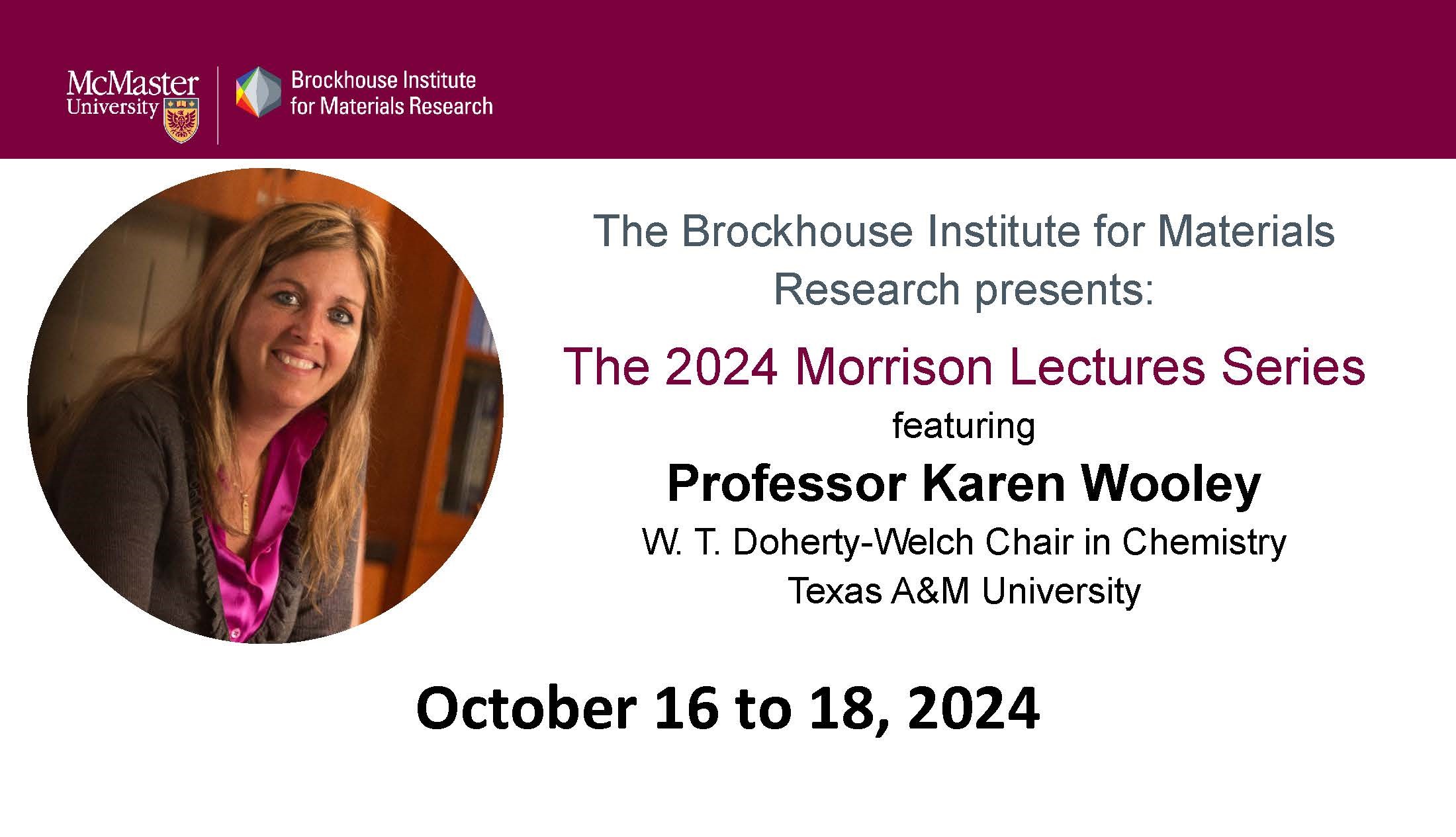2024 Morrison Lectures Series featuring Professor Karen Wooley
Oct 16, 2024 to Oct 18, 2024
6:30PM to 3:30PM

Date/Time
Date(s) - 16/10/2024 - 18/10/2024
6:30 pm - 3:30 pm
Categories
The Brockhouse Institute for Materials Research presents:
The 2024 Morrison Lectures Series
featuring Professor Karen Wooley
T. Doherty-Welch Chair in Chemistry at Texas A&M University
Professor Wooley will present three lectures:
Evening public lecture:
An introduction to Polymer Chemistry, with an Emphasis on the Evolution from Traditional Materials that have enabled Societal Progress and Technological Advances to Commercial Translation of Innovative Directions that will be Critical to a Sustainable Future.
Wednesday, October 16, 2024 – 6:30 – 7:30 pm – ABB 102
————————————————
Synthetic Strategies by which to afford Natural Product-Derived functional Polymer Materials that address Health-Food-Energy-Water Challenges.
Thursday, October 17, 2024 – 2:30 – 3:30 pm – JHE 264
————————————————
The Future of Polymer Materials as the world progresses along the Energy Transition – Dynamically-Reconfigurable Systems to Unconventional Sourcing of Feedstocks.
Friday, October 18, 2024 – 2:30 – 3:30 pm – ABB 102
A primary interest in the Wooley laboratory is the production of functional polymers („plastics“) from renewable sources that are capable of reverting to those natural products once their purpose has been served. A long-standing focus has been the development of synthetic methodologies that transform sugars, nucleic acids, amino acids and other natural products into polymer materials. This approach allows for the production of functional polymers from renewable sources that are capable of reverting to those natural products once their purpose has been served. This holistic life cycle approach is of importance from the perspectives of sustainable sourcing of materials feedstocks, while creating mechanisms for breakdown of the polymer materials after useful lifetime is complete, and providing for biological and environmental resorption of breakdown products. The overall process impacts the need to address the increasing accumulation and associated hazards of plastic pollution from the environmental persistence of non-degradable, petrochemically-sourced polymer systems. Moreover, inherent diversities of natural products provide opportunities to expand the scopes, complexities and properties of polymers, by utilizing fundamental organic chemistry approaches.
The following series of presentations will provide an overview of the progression from an emphasis on traditional polymer materials to the advancement of synthetic methodologies that harness the rich chemical diversity of natural products as sustainably-sourced feedstocks for construction of next-generation functional polymer materials, with each scientific and technical advance having been driven, academically, by fundamental curiosity and designed toward commercial translation to address practical applications that guide future societal, technological and environmental needs.
Biography:
Karen Wooley holds the W. T. Doherty-Welch Chair in Chemistry and is a University Distinguished Professor at Texas A&M University. She also has a joint appointment in the Department of Materials Science & Engineering. Wooley studied at Oregon State University (B.S., 1988) and Cornell University (Ph.D., 1993). As an undergraduate, she engaged in natural product total synthesis research in the laboratory of Steven J. Gould (deceased), and she then shifted to macromolecular chemistry with a focus on the synthesis and characterization of dendritic and hyperbranched polymers during Ph.D. studies under the direction of Jean M. J. Fréchet. The first sixteen years of her independent academic career were spent at Washington University in St. Louis, Missouri and she then relocated to Texas A&M University in July 2009.
In addition to her academic positions, she is a co-founder and President of Sugar Plastics, LLC, and Chief Technology Officer of Teysha Technologies, Ltd. Research interests include the synthesis and characterization of degradable polymers derived from natural products, unique macromolecular architectures, complex polymer assemblies, and well-defined nanostructured materials. She has designed synthetic strategies to harness the rich compositional, regiochemical and stereochemical complexity of natural products for the construction of hydrolytically-degradable polymers, which have impact toward sustainability, reduction of reliance on petrochemicals, and production of biologically-beneficial and environmentally-benign natural products upon degradation – these materials are expected to impact the global issue of plastic pollution and address challenges resulting from climate change.
Recent awards include election as a Fellow of the American Academy of Arts and Sciences (2015), National Academy of Inventors (2019), American Association for the Advancement of Science (2020), American Institute for Medical and Biological Engineering (2020), and National Academy of Sciences (2020); she was also named as the 2021 Southeastern Conference (SEC) Professor of the Year.
James A. Morrison
Prof. James Alexander Morrison (1918 – 1987) was a distinguished physical chemist who made significant contributions to the field of materials research. He served as the first Director of the Institute for Materials Research (IMR) at McMaster University, a position he held for 17 years (1969 to 1986). His leadership and vision helped establish the IMR as a leading research institute. Prior to his tenure at McMaster, Prof. Morrison spent twenty – two years at the National Research Council in Ottawa where he became Director of pure chemistry.
The Morrison lectures are a prestige series of lectures in materials science at McMaster University, and a real research highlight for our students and faculty.

